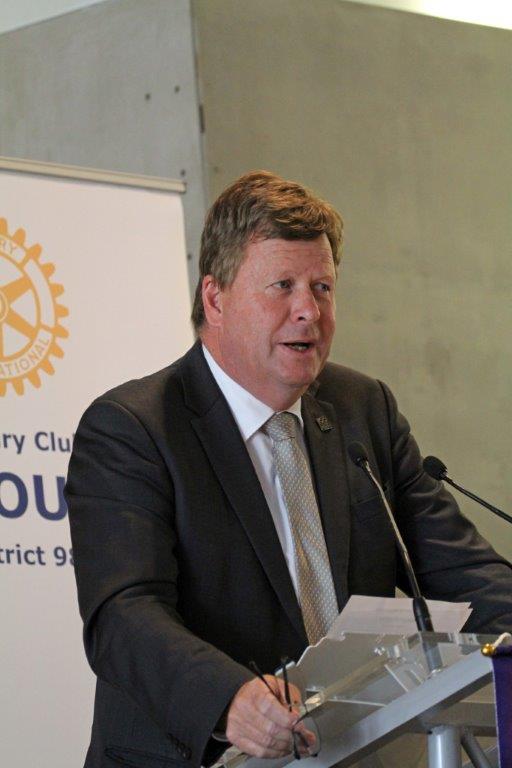|
 LUNCHEON - 4TH FEBRUARY 2015 LUNCHEON - 4TH FEBRUARY 2015
Speaker: The Hon. Michael Ronaldson, Federal Minister for Veteran Affairs, Minister Assisting the Prime Minister for the Centenary of Anzac.
Chairperson: Peter McCall
Senator the Hon. Michael Ronaldson is the Minister for Veterans’ Affairs, Minister Assisting the Prime Minister for the Centenary of ANZAC, Special Minister of State and a Liberal Senator for Victoria.
Senator Ronaldson was the Federal Member for Ballarat from 1981 to 2001 and during this time served as the Shadow Minister for Youth, Sport and Recreation, Shadow Parliamentary Secretary to the Leader of the Opposition and Shadow Minister for Schools, Vocational Education and Training. Following the 1996 election, Senator Ronaldson was appointed Parliamentary Secretary to the Minister for Transport and Regional Development and in 1998 was appointed the Chief Government Whip.
Following his retirement from the House of Representatives in 2001, Senator Ronaldson was a consultant and member of a number of boards including Snowy Hydro Limited. He was Co-chair of the Australian Ex-Prisoner of War Memorial project in his home city of Ballarat where he assisted with fundraising.
At the 2004 Federal election Senator Ronaldson was elected to the Senate representing the State of Victoria, with his term beginning on 1 July 2005. Following the 2007 election, Senator Ronaldson was appointed Shadow Special Minister of State. He served as Shadow Cabinet Secretary in September 2008 until December 2009. After the 2010 election, Senator Ronaldson was appointed Shadow Minister for Veterans’ Affairs and Shadow Minister Assisting the Leader of the Leader of the Opposition on the Centenary of ANZAC.
Senator Ronaldson has been the Minister for Veterans’ Affairs, Minister Assisting the Prime Minister for the Centenary of Anzac and Special Minister of State since September 2013.
Synopsis Of The Lunch
Senator The Hon. Michael Ronaldson, Minister for Veteran Affairs spoke at length about the responsibilities of caring for members of families of returned servicemen and women who have served in the Australian armed forces. The freedoms we all enjoy today have not come without the loss of thousands of young men and women’s lives. At the commencement of the 1st World War with Australia’s population being approximately 4,500,000, 430,000 men and women signed up, 345,000 served overseas, 150,000 returned home injured, wounded and ill and 60,000 did not return at all. The responsibilities being faced at the Centenary of ANZAC, this year 2015, is to ensure the young men and women of today clearly understand the When, the Where and the Why. They need to know when we fought, where we fought but even more importantly why we fought and the values that so many people paid the ultimate sacrifice to defend. The freedoms we enjoy today have not come cheaply but from the ultimate sacrifice of many tens of thousands of young Australian men and women. Mental illness is the greatest challenge facing the members of the armed forces today. It is termed, PTSD, Post-Traumatic Stress Disorder and is evident in many men and women who have served in theatres of war, the largest manifestation currently challenging the Department of Veteran Affairs is the lack of initial support, the poor diagnosis and inability to recognise the needs of the men who returned nearly 50 years ago from the battle fields of Vietnam.
Approximately 170 million dollars is paid out to Vietnam veterans and their families each year with that figure not being capped. The country treated the Vietnam veterans appallingly and we are still playing ‘catch-up’ for the disgraceful series of events perpetrated upon our serving men and women when they returned home to Australian shores.
Michael is a very strong advocate for the men and women he represents within his portfolio receiving a great deal of respect from those he serves as well as the department he administers. Thankfully for the veterans he serves, his opposite number in Federal parliament is also highly respected and both members work with a great deal of collegiality for the distinct benefit of the thousands of Australian men and women who gave so much when they themselves were in the prime of their youth and had so much to look forward to without physical and mental illness being their life long legacy in serving their country.
|